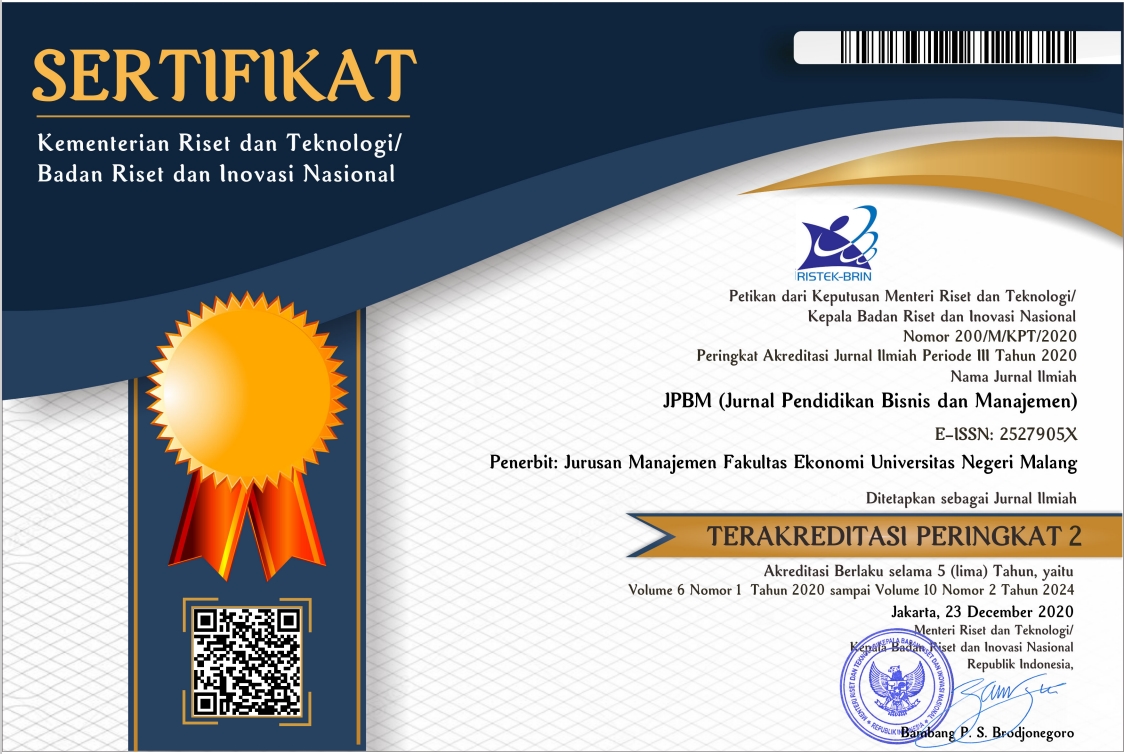Attitude Determinant in Entrepreneurship Behavior of Vocational Student’s Entrepreneurship Intention
Abstract
This present study was aimed at finding out the correlation of emotional intelligence, entrepreneurship self-efficacy, entrepreneurship behavioral attitude and entrepreneurship intention on vocational school students. The data were analyzed using SEM Smart PLS technique. The study revealed that there is a cause and effect correlation of emotional intelligence and entrepreneurship self-efficacy, entrepreneurship behavioral attitude toward entrepreneurship intention on vocational students in Mojokerto regency as described: 1) empirically, emotional intelligence was proven to have no direct influence on entrepreneurship intention, however, it has direct and strong influence on entrepreneurship behavioral attitude, 2) entrepreneurship self-efficacy has direct and strong influence on entrepreneurship behavioral attitude and entrepreneurship intention, and entrepreneurship self-efficacy also has indirect influence toward the entrepreneurship intention through entrepreneurship behavioral attitude, 3) entrepreneurship behavioral attitude has direct and strong influence toward entrepreneurship intention.
Keywords
Full Text:
PDFReferences
Alwisol. 2008. Personality Psychology. Malang: UMM Press.
Azwar, S. 2007. Human Attitude, Theory, and its Measurement. Yogyakarta: Pustaka Pelajar.
Baron, R. A. 2008. The Role of Effect in the Entrepreneurial Process. Academy of Management Revie, 33, 328–340.
Baum, J. R., & Bird, B. J. 2010. The Successful Intelligence of High-Growth Entrepreneurs: Links to New Venture Growth. Organization Science, 21, 397-412.
Bird, B. 1988. Implementing Entrepreneurial Ideas: The Case of Intentions. Academy of Management Review, 13(3), 442-453.
Boyd, N.G., & Vozikis, G.S. 1994. The Influence of Self-Efficacy on the Development of Entrepreneurial Intentions and Actions. Entrepreneurship: Theory and Practice, 18(4), 63-77.
Burch, G. F., Batchelor, J. H., & Humphrey, R. H. 2013. Emotional Labor for Entrepreneurs: A Natural and Necessary Extension. Entrepreneurship Research Journal, 3, 331-366.
Carmeli, A. 2003. The Relationship Between Emotional Intelligence and Work Attitudes, Behavior and Outcomes: An Examination Among Senior Managers. Journal of Managerial Psychology, 18, 788-813.
Chen, C. C., Greene, P. G., & Crick, A. 1998. Does Entrepreneurial Self-Efficacy Distinguish Entrepreneurs from Managers? Journal of Business Venturing, 13, 295-316.
Duke, C.R. 1996. Exploring Student Interest in Entrepreneurship Courses. Journal of Marketing Education, 18, 35-45.
Feist, J., & Feist, G. J. 2011. Teori Kepribadian. (Alih Bahasa: Smita Prathiba Sjahputri). Jakarta: Salemba Empat.
Fuller, B., & Marler, L. E. 2009. Change Driven by Nature: A Meta-Analytic Review of the Proactive Personality Literature. Journal of Vocational Behavior, 75, 329-345.
Goleman, D. 1996. Emotional Intelligence. Jakarta: PT Gramedia Pustaka Utama.
Huda, M. D. 2006. Emosi/emotion. Jakarta: Erlangga.
Humphrey, R. H. 2013a. The Benefits of Emotional Intelligence and Empathy to Entrepreneurship. Entrepreneurship Research Journal, 3, 287-294.
Kafetsios, K., & Zampetakis, L. A. 2008. Emotional Intelligence and Job Satisfaction: Testing the Mediatory Role of Positive and Negative Affect at Work. Personality and Individual Differences, 44, 712-722.
King, L. A. 2010. Psikologi Umum. (translated: Brian Marwendys). Jakarta: Salemba Humanika.
Kong, F., & Zhao, J. 2013. Affective Mediators of the Relationship Between Trait Emotional Intelligence and Life Satisfaction in Young Adults. Personality and Individual Differences, 54, 197-201.
Krueger Jr., N. F., Reilly, M. D., & Carsrud, A. L. 2000. Competing Models of Entrepreneurial Intentions. Journal of Business Venturing, 15, 411–432.
Krueger, N. 2000. The Cognitive Infrastructure of Opportunity Emergence. Entrepreneurship Theory and Practice, 24(3), 5-23.
Krueger, N.F., & Brazeal, D.V. 1994. Entrepreneurial Potential and Potential Entrepreneurs. Entrepreneurship Theory and Practice, 18(3), 91-103.
Kuratko, D.F., & Hodgetts, R.M. 2004. Entrepreneurship: Theory, Process and Practice. Mason, OH: Thomson Southwestern.
Lord, M. 1999, March 29. Attention, Aspiring Capitalists; B-school Students are Studying.
Lumpkin, G.T., & Dess, G.G. 1996. Clarifying the Entrepreneurial Orientation Construct and Linking it to Performance. Academy of Management review, 27(1), 135-172.
Mayer, J. D., Salovey, P., Caruso, D., & Sitarenios, G. (2003). Measuring emotional intelligence with the MSCEIT V2.0. Emotion, 3, 97–105.
McClelland, D.C. 1961. The Achieving Society. Princeton, NJ: VanNorstand.
Morris, M.H. 1998. Entrepreneurial Intensity Sustainable Advantages for Individuals, Organizations, and Societies. Westport, CT: Quorum.
Morris, M.H. 2006. Some thoughts on teaching issues in Entrepreneurship. A Public Lecture Presented at Lowa State University on January 27, 2006.
Sawaf, A & Cooper, Robert. 2002. Executive EQ, translated by Widodo. Jakarta: PT Gramedia Pustaka Utama.
Shane, S., & Venkataraman, S. 2000. The Promise of Entrepreneurship as a Field of Research. Academy of Management Review, 25, 217-226.
Shapero, A. 1982. Social dimensions of entrepreneurship. In C. A. Kent, D. L. Sexton, & K H.Vesper (Eds.), The Encyclopedia of Entrepreneurship (pp. 72–90). Englewood Cliffs, NJ: Prentice-Hall.
Suharyadi. 2007. Kewirausahaan Membangun Usaha Sukses Sejak Usia Muda/Entrepreneurship, Building Successful Business from young age. Jakarta: Salemba Empat.
Susianna, N. 2007. Chemical Learning Program to Develop Entrepreneurship Attitude in High School Students. Jurnal Pendidikan (5), 1-10.
Wiratmo, M. 1996. Pengantar Kewiraswastaan/Introduction to Entrepreneruship. Yogyakarta : BPFE, IKAPI.
DOI: http://dx.doi.org/10.17977/um003v4i12018p040
Refbacks
- There are currently no refbacks.
JPBM (Jurnal Pendidikan dan Bisnis Manajemen) is licensed under a Creative Commons Attribution-NonCommercial-ShareAlike 4.0 International License.
JPBM (Jurnal Pendidikan dan Bisnis Manajemen) is abstracted and indexed in :
















